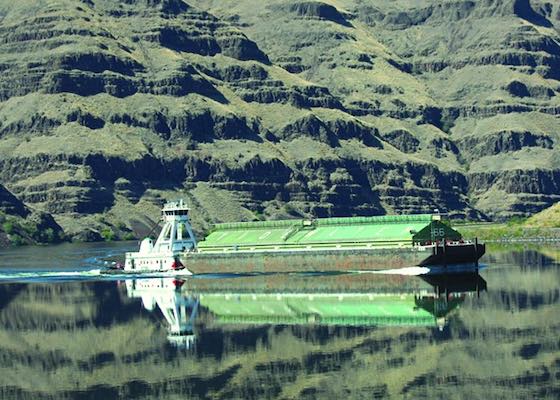forum
library
tutorial
contact

Snake River Shouldn't Risk
'The Sound of No Salmon'
by Berna Avunca
Everett Herald, November 23, 2023
|
the film forum library tutorial contact |

|
Snake River Shouldn't Risk
by Berna Avunca
|
Work to remove the dams on the lower Snake River
should start immediately to save the species.
 I wholeheartedly agree with the a recent commentary on restoring salmon habitat and the emphasis on unification ("Tulalip gathering signals progress for salmon's future," The Herald, Nov. 10).
I wholeheartedly agree with the a recent commentary on restoring salmon habitat and the emphasis on unification ("Tulalip gathering signals progress for salmon's future," The Herald, Nov. 10).
The collective voice and unwavering determination of the 16 Northwest Tribes at the "Rise Up in Unity" summit were a powerful testament to the strength and resilience of their communities. Their shared commitment to restoring the lower Snake River and its imperiled salmon populations serves as a light of hope for the future.
I must have been sitting in a slightly different part of the room than the author, though. There was a strong sense of urgency and a clear call for breaching where I was sitting. Nine Tribal leaders explained the urgency and the need for breaching the dams with stories from the heart on the first day. The word "remove" was not used until the second day, when the presenters were more political and their lines crisply rehearsed.
The author's suggestion that we must wait until all replacement services are in place before removing the dams is not agreeable. The urgency of the situation demands a more immediate and decisive approach. With every passing day, the salmon populations in the lower Snake River edge closer to extinction. The tribes and scientists clarified that over 40 percent of the salmon populations have already passed the criteria to meet NOAA's definition of extinction. This number is expected to be over 70 percent within three to four years. An undeniably clear message through the event was that we must act now to prevent irreversible damage. We cannot afford to wait to plan solutions for the next few years.
The author rightly points to the availability of resources to replace the services provided by the lower Snake River dams. We have the technology, the know-how, and the financial resources to transition to a clean energy future without relying on these outdated structures right now. What we lack is the unwavering commitment, sense of urgency and the will to choose the salmon and orca over politics to make this transition a reality.
During the summit, the tribes shared a captivating story that encapsulated the dire situation facing the salmon: "Do you hear that? It's the sound of no salmon." It was about standing by the river at the height of the spring spawning season and hearing no sound coming from the river. This poignant observation underscores the devastating decline of these iconic fish, once a staple of their diet. The tribes made a clear and urgent plea: they need our support, not just in words, but in actions.
To truly honor their call, we must set aside our agendas, truly listen to them, and embrace authenticity. We must listen to their wisdom, rooted in generations of living in harmony with the natural world to prevent the catastrophic loss of yet another species under our watch. Their insights and guidance are essential as we navigate this critical juncture in our history. It's time we listen and stand with them to give them what our Treaties give them, what we've been keeping from them for decades, and celebrate our power to cross onto the right side of history.
The time for delay is over. We must act now to begin breaching the lower Snake River dams while closing the minor gaps in services. A phased approach, beginning now, will allow us to restore the free-flowing river while ensuring a smooth transition to a clean energy future.
With unity, determination, and a genuine commitment to stand with the tribes, we can create a future where abundant energy, healthy salmon populations, thriving business opportunities, and justice for Northwest Tribes coexist. Let us seize this pivotal moment and act swiftly to stand behind the tribes to restore the health of the lower Snake River and its critically endangered salmon populations.
Related Pages:
Biden Calls for 'Abundant' Salmon Populations, Directs Agencies to Honor Tribal Treaty Rights by Courtney Flatt, Oregon Public Broadcasting, 9/27/23
learn more on topics covered in the film
see the video
read the script
learn the songs
discussion forum
